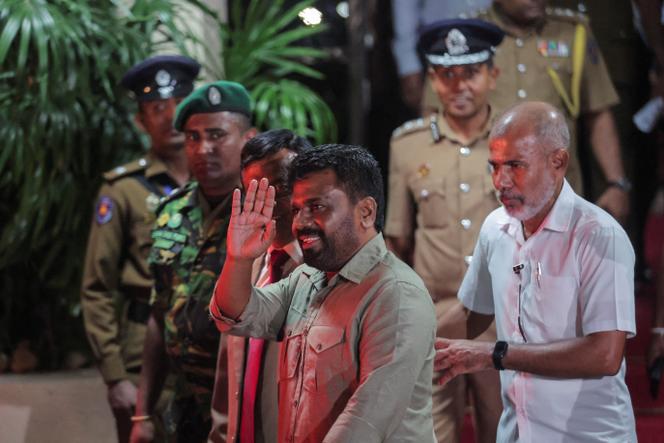


It was a long day in Sri Lanka on Sunday, September 22. It took hours of counting before the winner of the presidential election was announced. The results came early in the evening, despite a curfew imposed by the outgoing president, Ranil Wickremesinghe. Anura Kumara Dissanayake, 55, was announced as the Indian Ocean island's ninth president and its first Marxist president. Sri Lankans, who turned out in massive numbers – turnout was 77% – opted for a break with the past.
The process of proclaiming the results was a complex one. Dinassayake came out on top with 42.3% of the vote, but failed to break the 50% plus one vote mandate. For the first time in the country's history, the electoral commission had to count "preferential votes." Voters in Sri Lanka can choose a contender or rank the top three candidates in order of preference.
At the end of the count, Dissanayake was well ahead of his rivals: The center-right candidate, Sajith Premadasa obtained 32.7% of the vote and the highly unpopular incumbent president garnered just 17.2% of the vote. "This victory belongs to all of us," wrote the president-elect in a message on X. "Together, we stand ready to rewrite Sri Lankan history."
This son of farmers who has a degree in science used to be a simple member of parliament. He has no experience of power and his party has only three seats in Parliament. But, in the eyes of Sri Lankans, fed up with the stranglehold of a few nepotistic families who have succeeded one another in power for eight decades, he embodies renewal.
At the head of the National People's Power (NPP) – a coalition of left-wing parties, trade unions, members of civil society, women's groups and students, formed in 2019 – "AKD," as he is known to his supporters, has capitalized on the anger of Sri Lankans, hit for the past five years by a historic economic and financial crisis. This admirer of Che Guevara and Fidel Castro has succeeded in making people forget the violent past of his political group, the Janatha Vimukthi Peramuna, associated with two armed insurrections against the state in the 1970s and 1980s, which left thousands dead.
His victory bore a taste of revenge for the men and women who took part in the great citizens' revolution of 2022, demanding the departure of the president at the time, Gotabaya Rajapaksa, in office since 2019 and held responsible for the country's bankruptcy. At the end of these demonstrations, many protesters felt betrayed. Rajapaksa had fled the country, but no real political change followed. Parliament appointed Ranil Wickremesinghe as his successor, who was close to the Rajapaksa family and went to great lengths to protect them. All the demands of the "Aragalaya," the name given to the citizens' movement, were ignored, from the abolition of the executive presidency, which confers huge powers on the head of state, to the fight against corruption and the quest for justice.
You have 47.43% of this article left to read. The rest is for subscribers only.
